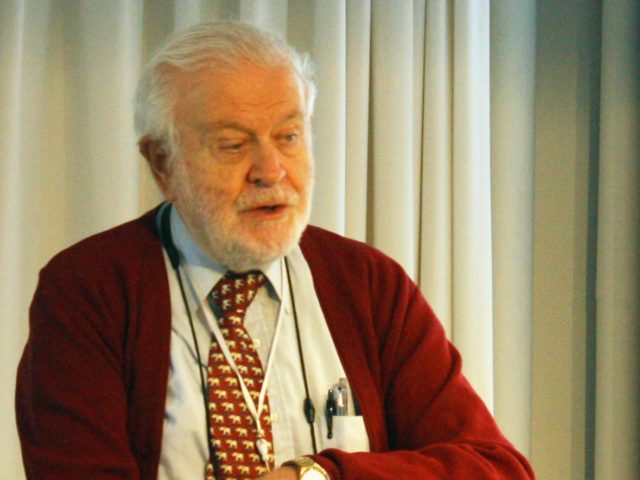Professor S. Fred Singer – Godfather of Climate Skepticism, Humiliator of Al Gore – has died aged 95.
It’s probably not a title he would ever have given himself: despite his hugely distinguished career, including wartime service in the U.S. Navy, and a stint designing rockets, culminating as professor of environmental sciences at the University of Virginia, Fred Singer was a charming, modest, soft-spoken and unfailing polite man who never blew his own trumpet.
But he did stick up for his principles and was more than prepared to damn the torpedoes, perhaps most notably when he stood up to a vexatious, powerful and bullying climate alarmist by the name of Al Gore.
The row began over Dr Roger Revelle, the brilliant Harvard professor credited by Al Gore in both his book Earth In Balance and his movie An Inconvenient Truth with having first alerted the young Al to the perils of man-made climate change.
In truth it was a lot more complicated than Gore made out. Revelle was in fact a climate change skeptic, not an ardent true believer. As he stated in an article for the journal Cosmos: ‘The scientific base for greenhouse warming is too uncertain to justify drastic action at this time.’
Gore responded to this inconvenient fact with a campaign of disinformation and character assassination. He persuaded a friend to circulate the story that the elderly Revelle (who died shortly after the Cosmos article was published) was coerced into publishing the article while sick and not in his right mind. (Singer later successfully sued the accuser for libel).
Also, as recounted in my book Watermelons, Gore rang ABC news presenter Ted Koppel urging him to expose the alleged fact that Singer and his fellow skeptics were being funded by the fossil fuel industry.
Koppel’s on air response displayed an integrity all too rare in modern broadcasting.
He said that there was:
“…Some irony in the fact that Vice President Al Gore – one of the most scientifically literate men to sit in the White House in this century – [is] resorting to political means to achieve what ultimately should be resolved on a purely scientific basis. The measure of good science is neither the politics of the scientists nor the people with whom the scientist associates. It is the immersion of the hypothesis into the acid of truth. That’s the hard way to do it, but it’s the only way that works.”
Singer was a climate skeptic, of course, not because he was funded by Big Oil, or the tobacco industry, or any of the other charges laid against him by alarmists – but simply because he cleaved to good science.
Born in Vienna in 1924, he arrived in the US in 1938 as a refugee from the Nazis, earned his PhD in physics from Princeton, and joined the U.S. Navy where he designed mines.
His dissertation was on cosmic rays – in subsequent research he predicted the magnetic radiation belts around the Earth later discovered by James Van Allen (after whom they are named). Later he joined the rocket program at Johns Hopkins University and became an early proponent of launching satellites for scientific research.
After the University of Maryland and the University of Miami (where he was founding dean of the school of atmospheric and planetary sciences) he ended up as professor of environmental sciences at the University of Virginia and latterly at George Mason University. In later years, worked with the CEI and the Heartland Institute to promote the cause of good science and honest skepticism.
His colleague and fellow skeptic Pat Michaels recalls:
Fred Singer was a true inspiration. When I first met him in 1979, I had just begun at UVA and was a callow 29-year-old. I soon realized that Fred told the truth, as inconvenient as it might be in a profession that was already soaking in the politics of the day. At the time, our department was awash in acid rain money. Fred remarked to me that rainfall was naturally acidic anyway, and it was hard to find any real forest damage from it, so maybe it should be called “half-acid rain.” I took all of that to heart and to this day treasure the nickname that my somewhat humorless colleagues hung on me: “Oh there goes Little Fred.” To me, that was an honor.
Another of his admirers was Professor Will Happer of Princeton University who has paid this tribute:
Those of us who were privileged to know and admire Fred can most fittingly honor him by embracing his guiding principles as our own. Among these were: understanding more about our majestic universe, reverence for the truth in science and human affairs, justice, kindness, and never giving up.

COMMENTS
Please let us know if you're having issues with commenting.